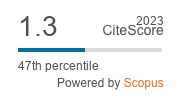Biodiversity As An Ecological Safety Condition. The European Dimension
DOI:
https://doi.org/10.1515/cer-2015-0006Keywords:
biodiversity, biodiversity protection, forms of nature protection, Natura 2000, ecological safety conditionsAbstract
Contemporary research concerning the benefits (services) of the ecosystems (environment) confirm the rank and significance of the natural environment and its resources for shaping humanity’s well-being. Particularly highlighted is the need to protection of live natural resources to preserve biodiversity, which is essential for retaining the basic ecological processes and providing the sustainability of usage of these resources. Consequently, protection of biodiversity is not only an environmental issue, but also an economic and social issue involving the well-being and quality of life of society. Thus, biological diversity is an essential condition for providing ecological safety, retaining the continuity of natural processes, and conditions the quality of life and economic potential. The main purpose of the paper is to indicate the theoretical bases of biodiversity protection from the perspective of the natural and economic sciences, and to describe the diversity of biodiversity protection levels in the EU states. A specific aim is to indicate the forms and instruments of nature conservation involved in biodiversity protection, and to carry out an overview of established nature conservation programmes in selected EU countries. In order to accomplish such a complex aim, this article presents an overview of literature found in the natural, economic and legal sciences and popular magazines presenting scientific research within the field of biodiversity. Then a comparative analysis is presented based on the statistical data coming from various international statistics resources (OECD, EUROSTAT, EEA).
Downloads
References
Andrzejewski R. (1983), W poszukiwaniu teorii fizjocenozy, ‘Wiadomości Ekologiczne’, 29, Centrum Badań Ekologicznych, Polska Akademia Nauk. Dziekanów Leśny k. Warszawy.
Google Scholar
Andrzejewski R. (1985), Ekologia a planowanie, ‘Wiadomości Ekologiczne’, 311, Badań Ekologicznych, Polska Akademia Nauk. Dziekanów Leśny k. Warszawy.
Google Scholar
Burchard-Dziubińska M., Drzazga D., Rzeńca A. (red.) (2014), Zrównoważony rozwój-naturalny wybór, Wydawnictwo Uniwersytetu Łódzkiego, Łódź.
Google Scholar
Costanza R. et al. (1997), The value of the world's ekosystem services and natura capital, ‘Nature’, No. 387.
Google Scholar
Ehrlich P., Wilson E.O. (1991), Biodiversity Studies: Science and Policy, Science 253.
Google Scholar
Environment conditions in Poland (2011), Raport Sygnały 2011, Biblioteka Monitoringu Środowiska, Warszawa.
Google Scholar
Fiedor B. (red.), (2002), Podstawy ekonomii środowiska i zasobów naturalnych, Wydawnictwo C.H. Beck, Warszawa.
Google Scholar
Harding G. (1992) Tragedia dóbr wspólnych [w:] G. Peszka, T. Żylicz (red.), Środowisko – społeczeństwo – gospodarka. Wybór przekładów z literatury anglosaskiej, Biblioteczka ‘Ekonomia i Środowisko’ – nr 4, Kraków.
Google Scholar
Jankowska-Kłapkowska A. (1993), Ekologiczne uwarunkowania rozwoju gospodarczego i społecznego, [w:] Interdyscyplinarne podstawy ochrony środowiska przyrodniczego, Ossolineum, Wrocław 1993.
Google Scholar
Joppa L., Roberts D.L., Primm S.L. (2010), How many species of flowering plants are there?, Proceedings of the Royal Society B: Bological Sciences 278.
Google Scholar
Kalinowska A. (2008), Artykuł 13. W poszukiwaniu społecznego wsparcia w zarządzaniu Konwencją o różnorodności biologicznej. Polska praktyka na tle doświadczeń światowych, CBD, Warszawa.
Google Scholar
Krajowa strategia ochrony i umiarkowanego użytkowania różnorodności biologicznej wraz z programem działań (2003), dokument zatwierdzony przez Radę Ministrów w dniu 25 lutego 2003 r., Warszawa.
Google Scholar
Krzymowska-Kostrowicka (1988), Gospodarka turystyczna w parkach narodowych i rezerwatach przyrody – zasady użytkowania i modele organizacji [w:] Gospodarka turystyczna w parkach narodowych i rezerwatach przyrody, LOP, Warszawa.
Google Scholar
Krzysztofek K., Szczepański M.S. (2002), Zrozumieć rozwój. Od społeczeństw tradycyjnych do informacyjnych, Wydawnictwo Uniwersytetu Śląskiego, Katowice.
Google Scholar
Mackenzie A., Ball A.S., Virdee S.R. (2001), Instant Notes Ecology, Second edition, Series editor B.D Hames, BIOS Scientific Publishers Limited.
Google Scholar
May R. (2010), Tropical arthropod species, more or less?, Science 329.
Google Scholar
Olaczek R. (1988), Gospodarowanie w parkach narodowych i rezerwatach przyrody w świetle obecnych i przewidywanych ich funkcji [in:] Gospodarowanie w parkach narodowych i rezerwatach przyrody, materiały z sesji naukowej LOP zorganizowanej w Warszawie 27 czerwca 1985, LOP, Warszawa.
Google Scholar
Pearce D.W. (1986), The Economics of Natural Resource Management, Projects Policy Department University College, London.
Google Scholar
Streamlining European biodiversity indicators 2020: Building a future on lessons learnt from the SEBI 2010 process, EEA Technical report No 11/2011, p.14, http://www.eea.europa.eu/publications/streamlining-european-biodiversity-indicators-2020
Google Scholar
Sweeney J. (1993), Economic Theory of Depletable Resources: an Introduction [in:] Kneese A.V.,
Google Scholar
Swenney J., Handbook of Natural Resources and Energy Economics, II, North-Holland, Amsterdam.
Google Scholar
Śleszyński J. (2000), Ekonomiczne problemy ochrony środowiska, Wydawnictwo ARIES, Warszawa.
Google Scholar
Toffler A. (1997), Trzecia fala, Państwowy Instytut Wydawniczy, Warszawa.
Google Scholar
The Millenium Ecosystems Assessment, Ecosystems and Human Well-being: Synthesis (2005), Island Press, Washington, D.C.2005.
Google Scholar
World Conservation Strategy. Living Resources Conservation for Sustainable Development, IUCN, Gland 1980; przekład polski: Światowa Strategia Ochrony Przyrody. Ochrona żywych zasobów dla trwałego rozwoju, LOP, Warszawa 1985.
Google Scholar
Woś A. (1995), Ekonomika odnawialnych zasobów naturalnych, Wydawnictwo Naukowe PWN, Warszawa.
Google Scholar
van Opstal A.J.F.M. (1999), The Architecture of the Pan European Ecological Network: Suggestions for Concept and Criteria, Rapport IKC Natuurbeheer, nr 37, Wageningen.
Google Scholar
http://www.wwf.pl/informacje/publikacje/inne/lpr2006final.pdf
Google Scholar
http://www.catalogueoflife.org/col/info/totals
Google Scholar
http://biodiversity.europa.eu/topics/sebi-indicators
Google Scholar
http://eur-lex.europa.eu/legal-content/EN/TXT/PDF/?uri=CELEX:32009L0147&from=EN
Google Scholar
http://eur-lex.europa.eu/legal-content/EN/TXT/PDF/?uri=CELEX:32009L0147&from=EN
Google Scholar
http://www.eea.europa.eu/data-and-maps/daviz/natura-2000-barometer#tab-dashboard-03
Google Scholar
http://ec.europa.eu/environment/nature/legislation/habitatsdirective/docs/Int_Manual_EU28.pdf
Google Scholar
http://www.eea.europa.eu/data-and-maps/daviz/natura-2000-barometer#tab-dashboard-03
Google Scholar
http://www.oecd.org/env/41069197.pdf http://stats.oecd.org/
Google Scholar
http://appsso.eurostat.ec.europa.eu/nui/submitViewTableAction.do?dvsc=3
Google Scholar
http://www.ti.bund.de/fileadmin/dam_uploads/vTI/Publikationen/Thuenen_Working_Paper/Thuenen_Working_Paper_19_Gesamt.pdf
Google Scholar
http://appsso.eurostat.ec.europa.eu/nui/show.do?dataset=env_bio2&lang=en
Google Scholar
http://www.oecd.org/env/41069197.pdf
Google Scholar
http://www.ti.bund.de/fileadmin/dam_uploads/vTI/Publikationen/Thuenen_Working_Paper/Thuenen_Working_Paper_19_Gesamt.pdf
Google Scholar
http://ec.europa.eu/environment/pubs/pdf/factsheets/biodiversity_2020/2020%20Biodiversity%20Factsheet_PL.pdf
Google Scholar
Downloads
Published
How to Cite
Issue
Section
License

This work is licensed under a Creative Commons Attribution-NonCommercial-NoDerivatives 4.0 International License.











